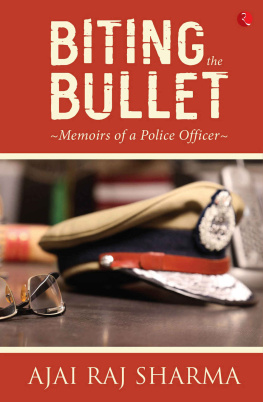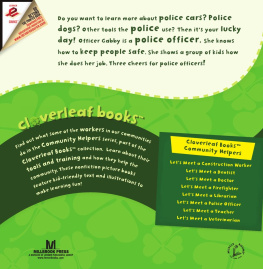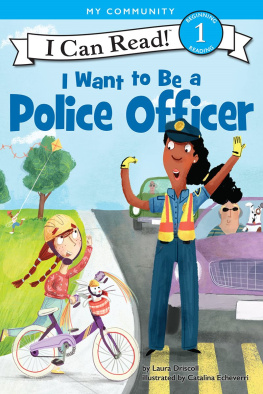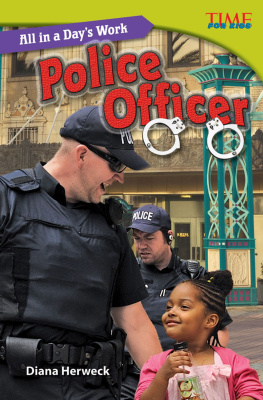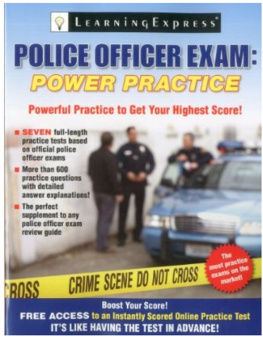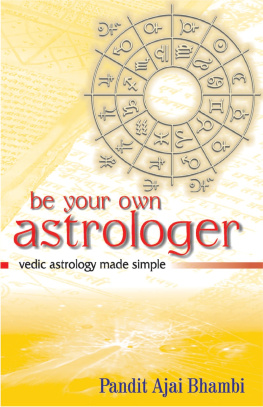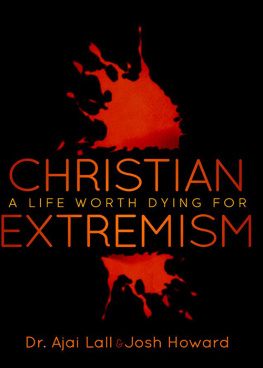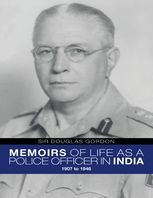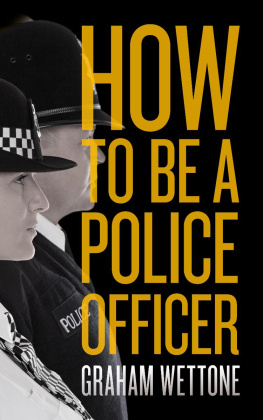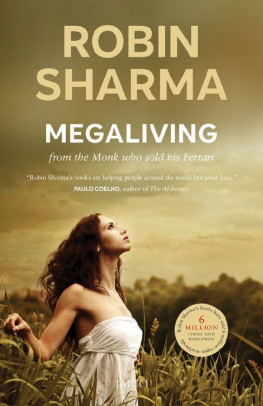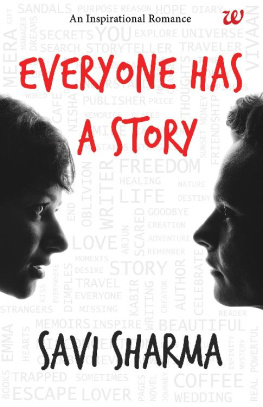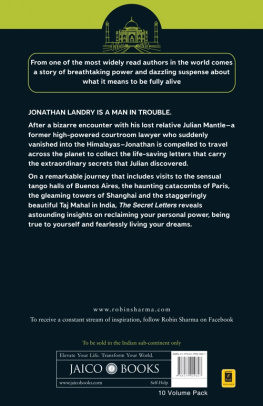Ajai Raj Sharma - BITING THE BULLET: Memoirs of a Police Officer
Here you can read online Ajai Raj Sharma - BITING THE BULLET: Memoirs of a Police Officer full text of the book (entire story) in english for free. Download pdf and epub, get meaning, cover and reviews about this ebook. year: 2019, publisher: Rupa Publications, genre: Non-fiction. Description of the work, (preface) as well as reviews are available. Best literature library LitArk.com created for fans of good reading and offers a wide selection of genres:
Romance novel
Science fiction
Adventure
Detective
Science
History
Home and family
Prose
Art
Politics
Computer
Non-fiction
Religion
Business
Children
Humor
Choose a favorite category and find really read worthwhile books. Enjoy immersion in the world of imagination, feel the emotions of the characters or learn something new for yourself, make an fascinating discovery.
- Book:BITING THE BULLET: Memoirs of a Police Officer
- Author:
- Publisher:Rupa Publications
- Genre:
- Year:2019
- Rating:4 / 5
- Favourites:Add to favourites
- Your mark:
- 80
- 1
- 2
- 3
- 4
- 5
BITING THE BULLET: Memoirs of a Police Officer: summary, description and annotation
We offer to read an annotation, description, summary or preface (depends on what the author of the book "BITING THE BULLET: Memoirs of a Police Officer" wrote himself). If you haven't found the necessary information about the book — write in the comments, we will try to find it.
BITING THE BULLET: Memoirs of a Police Officer — read online for free the complete book (whole text) full work
Below is the text of the book, divided by pages. System saving the place of the last page read, allows you to conveniently read the book "BITING THE BULLET: Memoirs of a Police Officer" online for free, without having to search again every time where you left off. Put a bookmark, and you can go to the page where you finished reading at any time.
Font size:
Interval:
Bookmark:


Published by
Rupa Publications India Pvt. Ltd 2020
7/16, Ansari Road, Daryaganj
New Delhi 110002
Copyright Ajai Raj Sharma 2020
The views and opinions expressed in this book are the authors own and the facts are as reported by him which have been verified to the extent possible, and the publishers are not in any way liable for the same.
All rights reserved.
No part of this publication may be reproduced, transmitted, or stored in a retrieval system, in any form or by any means, electronic, mechanical, photocopying, recording or otherwise, without the prior permission of the publisher.
ISBN: 978-93-5333-777-3
First impression 2020
10 9 8 7 6 5 4 3 2 1
The moral right of the author has been asserted.
This book is sold subject to the condition that it shall not, by way of trade or otherwise, be lent, resold, hired out, or otherwise circulated, without the publishers prior consent, in any form of binding or cover other than that in which it is published.
In the memory of my parents, my father, the late Indra Raj Sharma, and my mother, the late Umeshwari Sharma.
CONTENTS
INTRODUCTION
There is no limit to the good a man can do, if he doesnt care who gets the credit.
Benjamin Jowett
C ut to the chase. This phrase which dates back to Hollywood Westerns from the early 1930s has defined and governed my life in police. As children, we wanted to fast-forward all that boring dialogue and quickly get to those thrilling scenes in which the good guys mounted their horses to chase armed bandits across the desert. Over the years, this phrase has travelled from Hollywood to other parts of the world. I must confess with equal measure of pride and achievement, that my policing years have seen both the chasing of the bandits and coming to the point.
This book is a retelling of the life in khaki that I have proudly lived for more than four decades. I think of it more as a memoir than an autobiography, a chronicle of some of the best, most exciting and challenging adventures that I have had in uniform, chasing bandits, tracing terrorists, quenching communal fires, unearthing match-fixing syndicates and much more. After having served in the coveted Indian Police Service (IPS) for more than thirty-eight years and being in action for the most part of my professional life, writing about them feels surreal. For even though I am sitting in my quiet study, I feel like I can still hear the sharp crack of gunshots, the clap of hooves in the ravines of the Chambal, the sound of my own breath as I chase a dreaded dacoit through tall fields of sugarcane. I recall the complex circles of informers, the interrogations, nabbing criminals, and of course, the much maligned encounters Ive had. This is the life I have lived, and this memoir is a tribute to those moments that have brought me bouquets and brickbats at the same time.
How does one judge how good a police officer is? Is a good officer the one who always follows the rule book even if it means letting go of the criminal? Or is he or she the one who makes their own rules, who thinks nothing of bringing criminals and outlaws to justice, even if it means deviating from that rule book? There is no right or wrong answer. Most police officers operate in, what can be called, a vast expanse of grey area. Thus, for me, a good police officer is one who brings the culprit to the book, without jeopardizing his conscience. This might sound strange coming from a police officer who has been known to devise his own means and methods to nab criminals. However, my conscience has always been my guiding star. Some people have called me an encounter specialist but believe me, this is a term I detest. For me, it is no badge of honour and, in fact, the usage of the term is flawed. Others, especially some friends in the media, nicknamed me Dirty Harry, knowing my record of eliminating criminals. Honestly, this does not give me a high either; never has and never will. All I have done is reacted to a situation, devised my plans, motivated the bunch of officers working under me and with me and got the job done. After all, someone has to get his hands dirty to clear the filth. If that makes Harry dirty, so be it.
I have been fortunate in my career that some of the most high profile cases came on my radar, and I was able to deliver them successfully. The 2001 December Parliament attack, the match-fixing scandal, the terrorist attack at the Red Fort, the formation of the Special Task Force (STF) and killing of Sriprakash Shuklathese are some of the cases that come to mind, when people talk about me. Over the past few years, they have defined me, and the common comment when people see me is, Oh! This is Ajai Raj Sharma of the Parliament attack case! or, Oh, so you are that Ajai Raj Sharma who created the STF and eliminated Sriprakash Shukla! These definitely are some of the most famous and high-profile cases that were sensational at the time they occurred, but these are just a part of my career, albeit an exciting part. These cases do feature prominently in the book, but I will take my readers further back in time and tell stories that served as my training ground, cases that baptized me, that made me. Stories of dacoits and banditry, of the rustic terrains of Chambal and Farrukhabad, of gangsters (and unlike what they show in Bollywood films, dacoits dont use horses!) and their paramours, of the deceptive world of informers and brutal killings and of coming face-to-face with a dreaded dacoit of Chambal and negotiating with him, I started my career in these Badlands and the time has now come to take you through my journey.
My policing journey began in Agra when, as a young IPS officer, freshly minted from the academy, I was asked to serve in the rough terrains of Uttar Pradeshs (UP) proverbial Wild West. For a complete greenhorn to be thrown in the area infested with dacoits, it was overwhelming. I could have failed by the sheer prospect of locking horns with the outlaws who would not think twice before firing. But I told myself that perhaps I was being chosen for this to prepare myself for various challenges in future. This was proved right.
They say that as a police officer, you never quite get over that first encounter with death, which is why, although I have seen more than my fair share of bloodshed, violence and death over the years, Ill never forget the face of Sub-inspector (SI) Mahavir Singh who was shot dead by dreaded dacoits during my first posting in Agra. If Mahavir Singhs saga is that of an honest police inspector laying down his life for duty, Omkar Singh Yadavs tale is no less dramatic than a Bollywood film. Here was a uniformed man, who was so wronged in life that he took to the gun! The dreaded Sheodan Kachhis story is even bloodierhe would sadistically make his victims family members dance over the victims corpse! Ive often said a thriller should be made on his rise and ultimate fall. I hear that a film is being made on him right now and this vindicates my point.
These characters have stayed with me throughout my life. Some still make me recoil with horror, others with sadness. I remember how we cultivated a criminal as an informer. He was planted in a gang as our mole. He gave us very good intelligence that eventually helped us to neutralize the gang. But the script of life does not necessarily have a happy ending. My informer had to pay for his efforts with his life. In modern parlance, it is called collateral damage, but I still feel the pain of losing him after so many years. In modern times, personnel serving in the force are provided with counselling sessions to counter post-traumatic stress disorder, but during the 1960s and 1970s, such practices were unheard of. An officer had to bear and live with his pain and find ways to overcome it himself.
Next pageFont size:
Interval:
Bookmark:
Similar books «BITING THE BULLET: Memoirs of a Police Officer»
Look at similar books to BITING THE BULLET: Memoirs of a Police Officer. We have selected literature similar in name and meaning in the hope of providing readers with more options to find new, interesting, not yet read works.
Discussion, reviews of the book BITING THE BULLET: Memoirs of a Police Officer and just readers' own opinions. Leave your comments, write what you think about the work, its meaning or the main characters. Specify what exactly you liked and what you didn't like, and why you think so.

